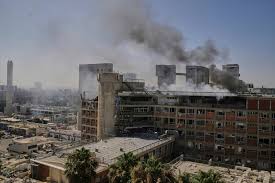What happened when missiles rained down in Israel: An account from Indians working there

Tel Aviv/Jerusalem, June 2025 — As missile sirens echoed across Israel’s densely populated cities, chaos unfolded in seconds. Streets emptied, lives were disrupted, and fear gripped thousands. Among those caught in the middle of the escalating conflict were hundreds of Indian nationals working and residing across Israel — from tech hubs like Tel Aviv to agricultural regions in the south. Their stories reveal the raw human emotion behind international headlines, offering a rare window into life during sudden attacks.
A Morning Like No Other
For 29-year-old Arjun Nair, a civil engineer from Kerala working in Tel Aviv, the day began like any other. “I had just made my morning tea when the first siren went off. Within seconds, my phone buzzed with emergency alerts. I didn’t even put on shoes — I just ran to the nearest bomb shelter in my apartment block,” he recounts.
Israel’s Iron Dome defense system, known for intercepting incoming rockets, has become a familiar presence in the skyline. Yet, when rockets are launched in large barrages, even the most robust systems have limits. “The sound of interception — the boom in the sky — is something you can never truly get used to,” Arjun adds, his voice tinged with unease.
Nurses in Crisis
In Ashkelon, closer to the Gaza border, Pooja Rawat, a nurse from Uttarakhand working at a private hospital, was in the middle of her shift when she was ushered into a fortified ward. “We had to move patients to emergency areas in less than five minutes,” she says. “Many were elderly or unconscious. We didn’t have time to panic — just act.”
For nurses like Pooja, the challenge isn’t just about personal safety. It’s about helping others remain calm while hiding their own fear. “We sang songs with children, spoke softly to old patients. War doesn’t feel far away when the ground shakes beneath your feet,” she reflects.
Farm Workers Left Vulnerable
Further south in rural areas near Be’er Sheva, where hundreds of Indian workers are employed in agricultural sectors, the experience was far more dire. With limited shelters in the fields and little time to react, many had to take cover in makeshift bunkers or even trenches.
Manoj Patil, a migrant worker from Maharashtra, recalls the confusion. “There was no siren where we were. Only when we saw our Israeli co-workers running did we understand something was wrong. We dropped everything and hid behind concrete walls.”
These rural areas often bear the brunt of short-range rocket attacks. The Indian Embassy later issued advisories urging workers to stay indoors and remain in touch with local coordinators.
Communication Lifelines
With family members back home gripped by anxiety, staying in touch became vital. “My parents in Mumbai were watching news nonstop. Every time a siren went off here, I would get a dozen missed calls,” says Priya Das, a software consultant in Haifa.
For many, WhatsApp groups with fellow Indians in Israel served as both a source of comfort and real-time information. “We shared shelter locations, air raid timings, and even emotional support. It’s not just about physical survival, but mental strength,” adds Priya.
Diplomatic Support and Safety Measures
India’s embassy in Tel Aviv has been actively monitoring the situation. Emergency hotlines have been made available, and embassy officials are reportedly in contact with Indian community representatives across the country.
“We have advised Indian nationals to stay close to shelters, avoid unnecessary travel, and follow Israeli government instructions strictly,” the Embassy said in a public statement. So far, no Indian casualties have been reported, although several workers faced minor injuries during hurried evacuations.
Holding on to Normalcy
Despite the tension, some Indians have tried to maintain a semblance of routine. In relatively safer cities like Netanya and Herzliya, many continued remote work, stocked up on essentials, and tried to maintain regular schedules.
“I cook, pray, and keep the TV on low volume to stay updated,” shares Shruti Mishra, a marketing executive from Delhi. “I don’t go outside unless absolutely necessary, but I refuse to live in fear.”
Local Israeli residents have also shown solidarity. Some have invited Indian neighbors into their fortified rooms, shared food, and even provided psychological support. “We’re all human in moments like this,” says Arjun. “It doesn’t matter where you’re from.”
Looking Ahead with Hope
With ceasefire talks ongoing and international pressure mounting for de-escalation, many Indians hope the situation will stabilize soon. But until then, they remain cautious and resilient.
“I don’t know what tomorrow brings,” Pooja says. “But I know we’ve formed bonds in this country that make us feel less alone.”
The experience has left a lasting impact. “I came here for work, to build my future,” Manoj reflects. “Now, I’ve learned how precious life really is.”
Conclusion
While the world often sees conflict through numbers and political headlines, it’s the human stories that offer the clearest truth. For the Indians in Israel, the recent missile attacks were more than breaking news — they were lived experiences of fear, strength, and solidarity. As the skies slowly quiet and sirens fade, their stories remain a testament to resilience far from home.






